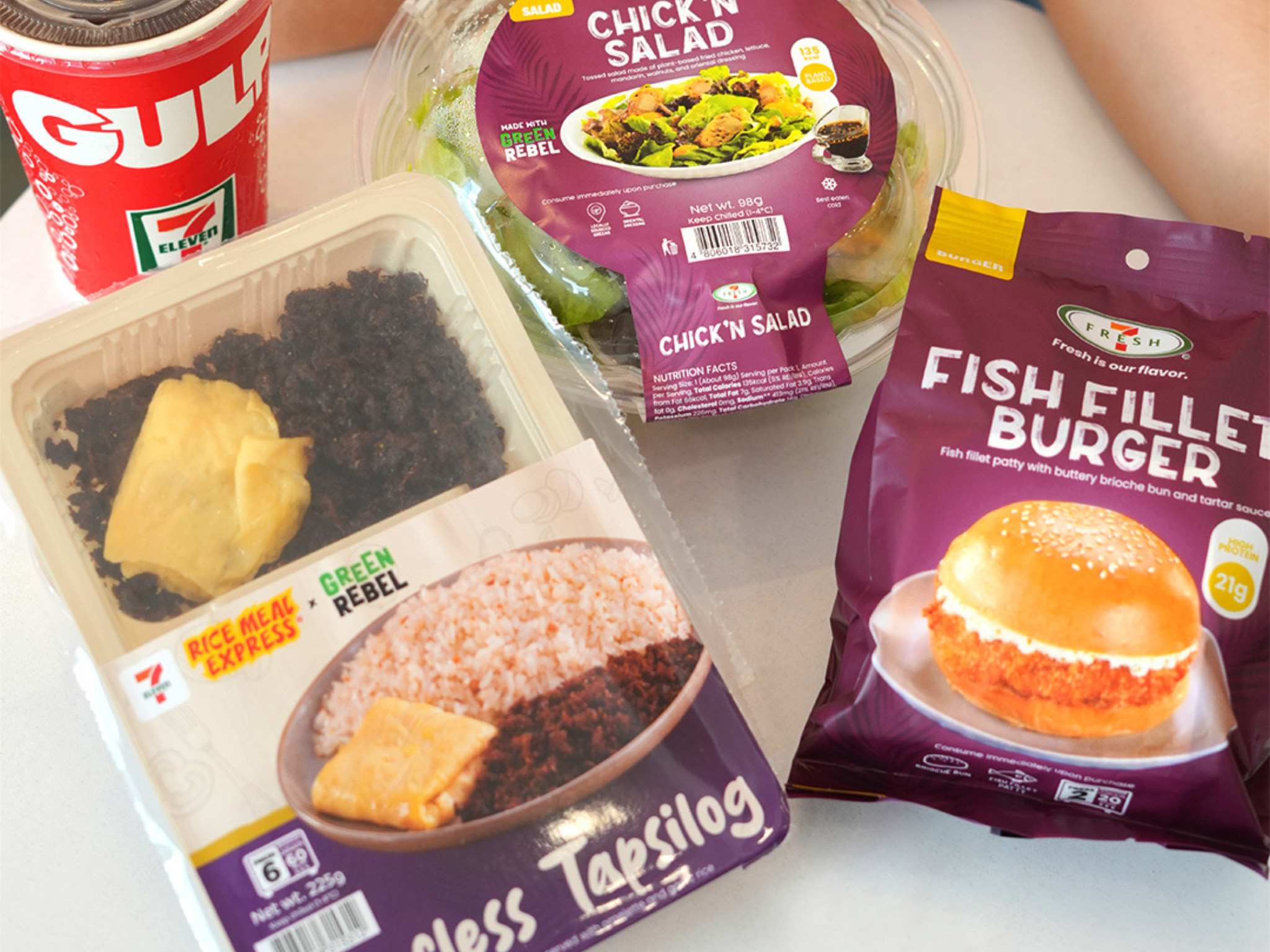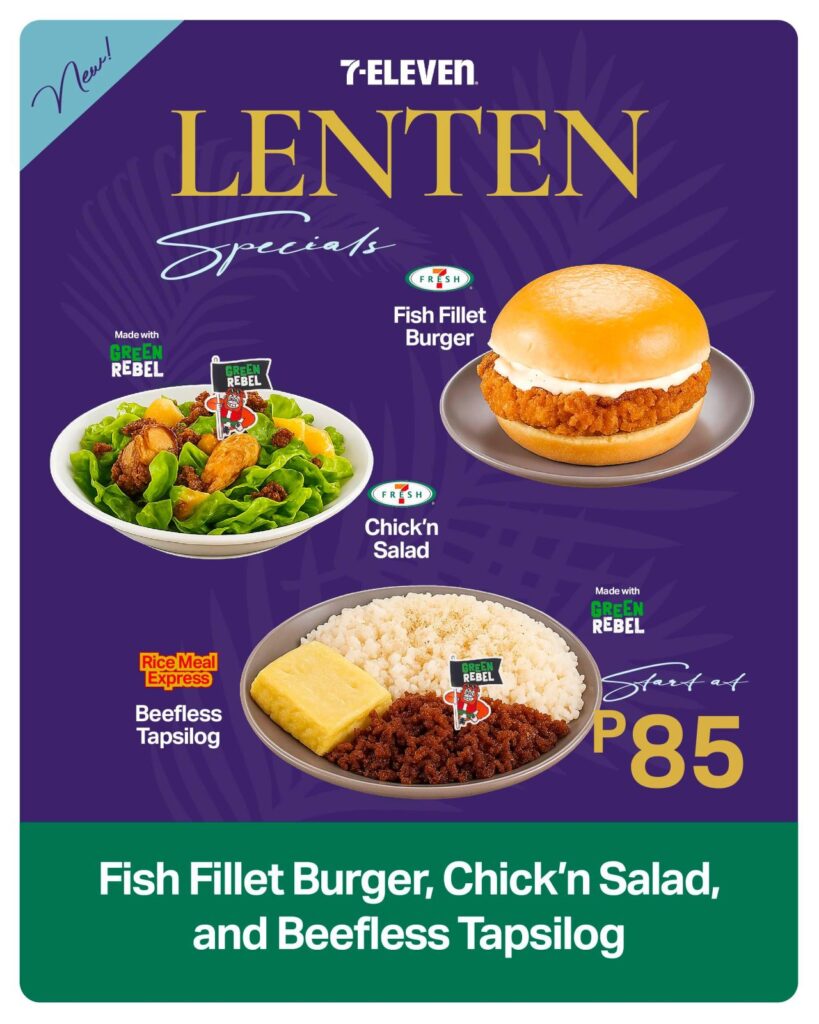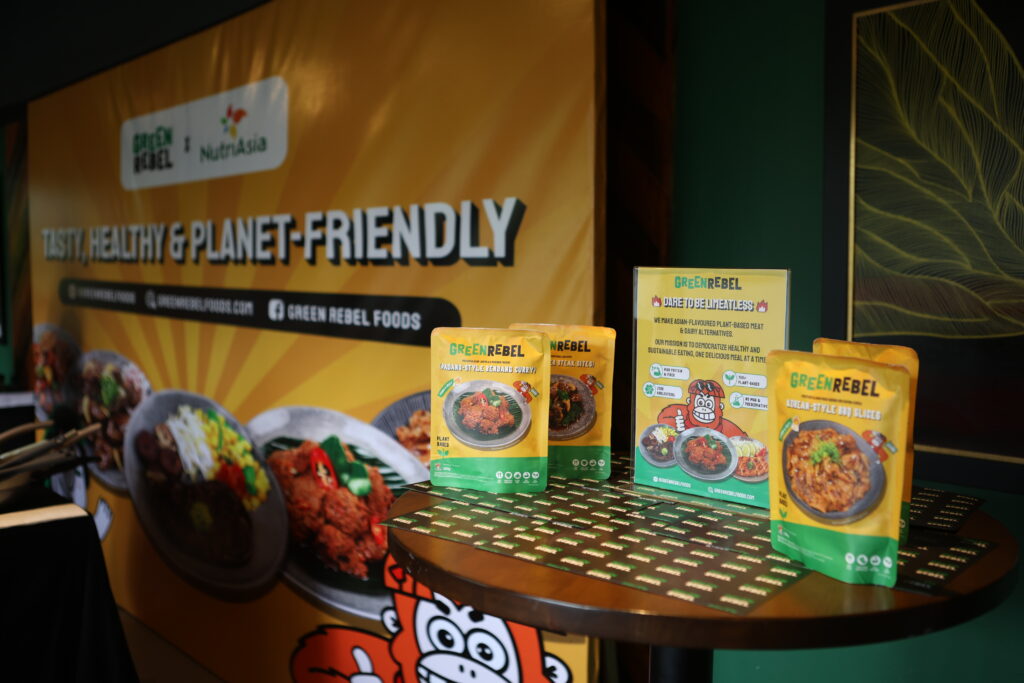
4 Mins Read
Indonesian plant-based meat pioneer Green Rebel Foods has rolled out two products at 7-Eleven Philippines, both as retail offerings and as part of in-store meals.
While sales of meat alternatives are falling in certain markets, global retailers are being urged to offer a higher share of plant proteins to battle climate change, improve public health, and safeguard food security.
Several supermarkets in Europe – including Lidl, Ahold Delhaize and Rewe Group – are answering that call with ‘protein split’ sales targets and price parity for vegan alternatives. That momentum is now shifting to Asia too.
In the Philippines, convenience store chain 7-Eleven is now offering products and meals featuring plant-based meat and fish from Indonesia’s Green Rebel Foods.
While the partnership started as a promotion for the Catholic fasting Lenten season, it has now been expanded to over 2,000 stores across the country, keying into Filipinos’ openness to plant-based meat. A 2024 survey by alternative protein think tank the Good Food Institute (GFI) APAC, found that these consumers held the most positive perceptions of plant-based meat in the region (alongside Indonesians).
7-Eleven continues to champion meat-free eating

7-Eleven first announced the partnership in late March, adding two Green Rebel products on dishes for its Lenten Specials menu.
The first, a Chick’n Salad with Green Rebel’s vegan fried chicken, is made from soy and wheat protein and contains lettuce, walnuts, mandarins, and an Oriental-style dressing.
The second dish, a Beefless Tapsilog, was part of the retailer’s Rice Meal Express series, putting a spin on a local breakfast favourite. Traditionally, the dish combines sweet and salty peppery beef with crunchy garlic fried rice and a fried egg.
7-Eleven’s version made use of Green Rebel’s beef mince, made primarily from soy flour, and paired it with garlic rice and an omelette.
The success of the activation has led to an extension of the partnership, with the meals available at over 2,000 7-Eleven stores across the Philippines following the end of the Lenten Season.
In addition, the retailer is offering packaged versions of the plant-based fried chicken and mince for consumers to cook at home, delivering a win for Green Rebel, which only entered the Philippines a year ago via a deal with local condiment manufacturer and distributor NutriAsia.
This isn’t the first time 7-Eleven has championed plant proteins. It has a history of offering vegan products at its convenience stores globally, whether they’re private-label meals or branded products. The retailer was a gateway for Impossible Foods in Singapore, and has previously partnered with OmniPork and Unlimeat to offer plant-based meals at its Hong Kong locations.
Next month, it will begin stocking Odd Burger’s crispy chicken, burgers, and breakfast sausages at over 500 of its locations in Canada. It comes four years after it teamed up with Lightlife to offer its meat-free chicken tenders at more than 600 stores in the country.
Green Rebel bet on Philippines’ appetite for plants

Founded in Indonesia in 2020, Green Rebel offers a range of plant-based meats (including whole cuts), cheeses and meals. They leverage its proprietary Rebel Emulsion Technology, which helps recreate the mouthfeel of animal protein via an emulsion of coconut oil, water and natural plant-based seasonings.
They’re available in over 1,200 foodservice locations and more than 300 retail stores across Indonesia, Singapore, Vietnam, Malaysia and the Philippines. The 7-Eleven partnership is part of a growing list of landmark partnerships for the brand, which include deals with Starbucks, AirAsia, Tous Le Jours, NTUC FairPrice and Annam Gourmet.
The company says its products need 80% less energy and 67% less water than animal-derived meat, and reduced 48,000 tons of greenhouse gas emissions between 2022 and 2024.
It linked up with NutriAsia last year to enter a country with high potential for plant-based eating. The GFI APAC survey found that 24% of Filipinos were looking to reduce their meat consumption in 2024, and 55% aimed to increase their intake of plant-based meat, with health being the primary driver.
Three-quarters of consumers think vegan meat analogues are healthier, and 49% say more nutritious offerings would encourage them to increase their consumption of these products. In fact, health is by far the top factor that would influence Filipinos to choose plant-based meats over their conventional counterparts, with 66% citing this.
Green Rebel’s products are high in protein and fibre, and contain up to 50% less saturated fat, 30% fewer calories, and zero cholesterol, compared to conventional meats. This will appeal to people in the Philippines, 75% of whom hadn’t tried plant-based meat but said they’d likely do so last year.
“NutriAsia is the leading sauce and condiment manufacturer in the Philippines, while Green Rebel focuses on Asian-flavoured plant-based meat and dairy-free cheeses. This also opens a product collaboration opportunity, targeted for Filipino consumers,” Green Rebel co-founder and CEO Helga Angelina told Green Queen last year.
“Crafting delicious, sustainable food isn’t just our passion; it’s our commitment to redefining the future of dining,” she added. “Every dish we create at Green Rebel is a testament to our belief that flavour, and sustainability go hand in hand, offering a tantalizing glimpse into a world where every meal nourishes both body and planet.”
The post Green Rebel x 7-Eleven Philippines: Southeast Asian Startup Expands Meat-Free Meals to 2,000+ Stores appeared first on Green Queen.